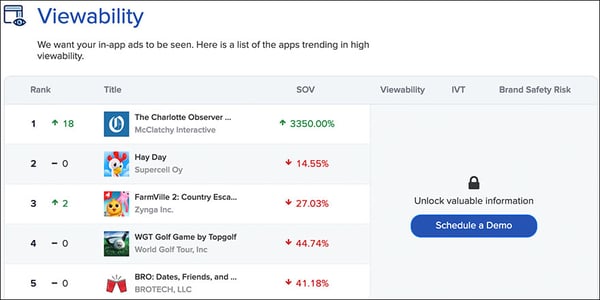
This week's review of ad fraud and quality in the digital advertising space.

Pixalate, an industry leader in ad fraud protection and mobile in-app advertising inventory quality, has released its App Trends Reports, which reveal the latest trending apps based on a variety of key signals important to advertisers.
.jpg?width=600&name=Display-iOS-tablets-US-share-of-voice-(Q4-2018).jpg)
Pixalate highlights the top 10 trending iPhone apps in the United States, based on display and video programmatic advertising volume, in Q4 2018. Games accounted for eight of the top 10 spots for iPad display advertising, and all eight were either word games, puzzle games, or solitaire games.
See more of the trending iPad apps.

"Transparency isn’t as relevant to larger advertisers as it was a year ago," wrote Digiday. "The catch-all term for everything that’s wrong with advertising has given way to concerns about brand safety and contextual targeting that have shifted the focus back to effectiveness, according to advertisers, agencies, ad tech vendors and media owners" at ISBA's annual conference, held this week.
"[Unilever] is exploring new solutions to the same old problems of brand safety, ad fraud and personalization as it comes to terms with how each one damages the image of brands and wastes ad budgets," reported Digiday.

"ExchangeWire speaks with Eric Bozinny, director, inventory quality, PubMatic, about the company’s efforts to improve quality within the programmatic landscape," wrote ExchangeWire introducing its Q&A with PubMatic's Bozinny. "Bozinny explains the different elements of inventory quality, and why it’s more than just fraud."

"Google will move to first-price auctions for Google Ad Manager, its publisher exchange and ad server, by the end of 2019," reported AdExchanger. "At that time, it will also run a single, unified auction and remove last look, ceding a key advantage Google held in a second-price world."
"First-price auctions will increase transparency, reduce operational complexity for sellers and make it easier for buyers and agencies to properly value inventory, Sam Cox, Google group product manager, wrote in a blog post," wrote AdExchanger.
*By entering your email address and clicking Subscribe, you are agreeing to our Terms of Use and Privacy Policy.
These Stories on Weekly Recaps
*By entering your email address and clicking Subscribe, you are agreeing to our Terms of Use and Privacy Policy.

Disclaimer: The content of this page reflects Pixalate’s opinions with respect to the factors that Pixalate believes can be useful to the digital media industry. Any proprietary data shared is grounded in Pixalate’s proprietary technology and analytics, which Pixalate is continuously evaluating and updating. Any references to outside sources should not be construed as endorsements. Pixalate’s opinions are just that - opinion, not facts or guarantees.
Per the MRC, “'Fraud' is not intended to represent fraud as defined in various laws, statutes and ordinances or as conventionally used in U.S. Court or other legal proceedings, but rather a custom definition strictly for advertising measurement purposes. Also per the MRC, “‘Invalid Traffic’ is defined generally as traffic that does not meet certain ad serving quality or completeness criteria, or otherwise does not represent legitimate ad traffic that should be included in measurement counts. Among the reasons why ad traffic may be deemed invalid is it is a result of non-human traffic (spiders, bots, etc.), or activity designed to produce fraudulent traffic.”

